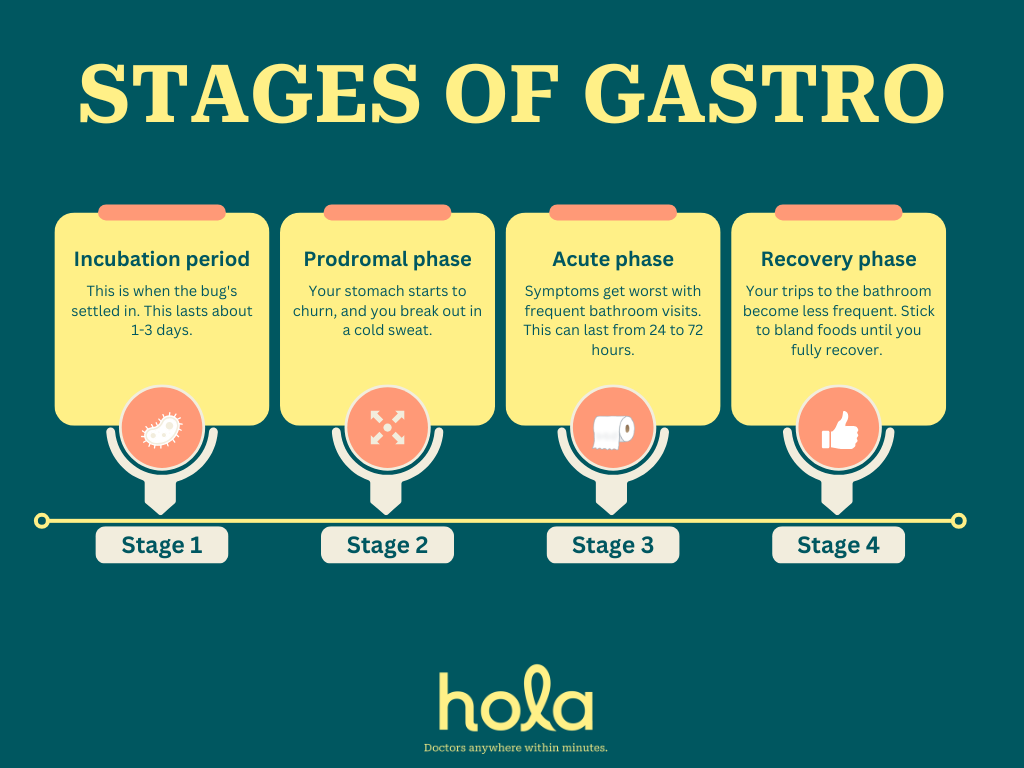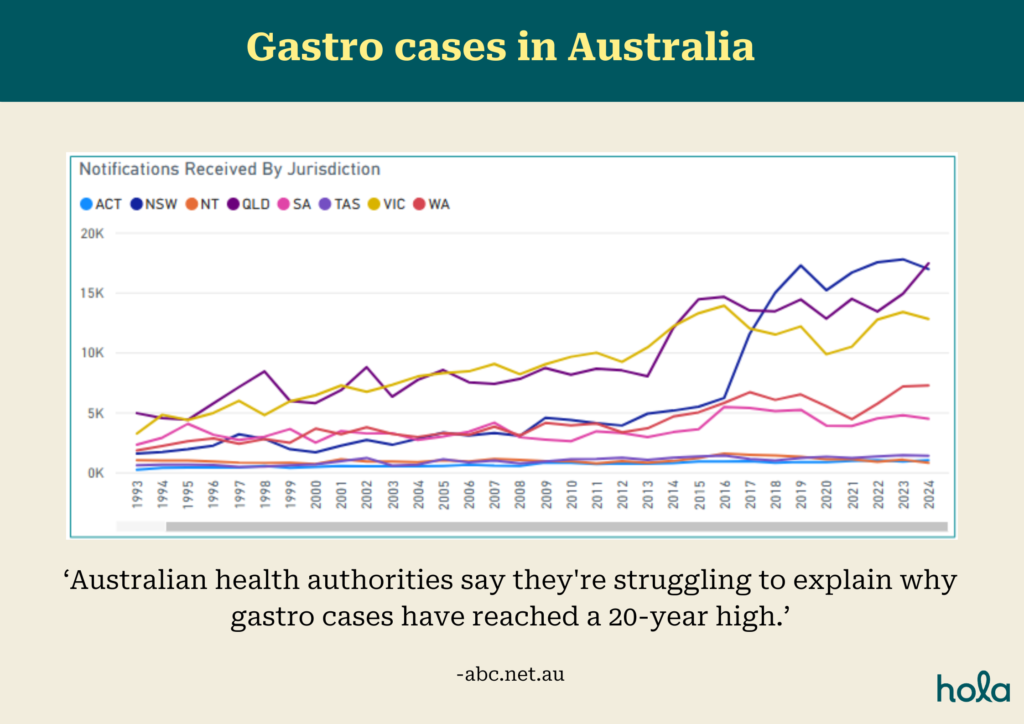Stages of Gastroenteritis in Adults
Written by Dr Nelson Lau, MBBS FRACGP, GP & Digital Health Specialist. Originally published on 24 June 2024. Blog updated on 10 March, 2025.

Contents

Overview
Gastroenteritis, commonly known as the stomach flu, is an inflammation of the stomach and intestines, usually caused by viruses, bacteria, or toxins. It leads to symptoms such as diarrhoea, vomiting, abdominal cramps, and fever. The illness progresses through four stages: incubation, prodromal, acute, and recovery. Treatment mainly focuses on hydration, rest, and a gentle diet. While most cases resolve on their own, severe dehydration or prolonged symptoms require medical attention. Prevention involves good hygiene, safe food handling, and vaccinations.What exactly is gastroenteritis?
Simply put, gastroenteritis is when your stomach and intestines get inflamed. Usually, it's thanks to a virus or bacteria that has entered your digestive system. Sometimes parasites or even food toxins can be the culprits. Whatever the cause, the end result is the same: a combination of diarrhoea, vomiting, cramping, and possibly fever.Symptoms of gastroenteritis in adults
Gastroenteritis symptoms vary depending on the cause but typically include:- Watery diarrhoea
- Nausea and vomiting
- Abdominal cramps and pain
- Fever and chills
- Fatigue and weakness
- Loss of appetite
- Headache and body aches
What causes gastroenteritis in adults?
Gastroenteritis can be caused by various factors, including:- Viruses: Norovirus and rotavirus are the most common viral causes.
- Bacteria: Salmonella, E. coli, and Campylobacter can lead to bacterial gastroenteritis, often through contaminated food or water.
- Parasites: Giardia and Cryptosporidium are less common but can cause prolonged symptoms.
- Toxins and chemicals: Consuming contaminated or spoiled food can lead to irritation and inflammation of the digestive tract.
Also read: Norovirus infection: when to consult a doctor? - Hola Health
Stages of gastro
 Let's break down how this uninvited guest typically overstays its welcome:
Let's break down how this uninvited guest typically overstays its welcome:
Incubation period
First off, there's the incubation period. This is when the bug's settled in, but you're blissfully unaware. For most stomach viruses, this lasts about 1-3 days. You're feeling fine, going about your business, maybe even wondering why your coworker called in sick.Prodromal phase
Then it hits you. Maybe you're sitting at your desk when a wave of nausea washes over you. Your stomach starts to churn, and you break out in a cold sweat. Now you've entered what's known as the prodromal phase. This is your body's way of telling you that things have just started and are about to get worse.Acute phase
This is when your symptoms are at their worst. You're running to the bathroom every five minutes and your stomach feels like it's trying to turn itself inside out. This phase can last anywhere from 24 to 72 hours, sometimes even longer if you're really unlucky.Recovery phase
You finally enter the recovery phase. The storm's passing, but you're left feeling washed out. Your trips to the bathroom become less frequent, and you might even start thinking about food again. Just stick to bland foods in the meantime until you've had time to fully recover. Summary: Gastroenteritis progresses through four stages, starting with silent incubation and worsening into severe symptoms before gradual recovery.Experiencing these symptoms? Speak with a doctor within 15 minutes.
How is stomach flu treated in each stage?
Gastroenteritis can be tough to endure, but understanding how to manage each stage effectively can help speed up recovery and prevent complications. Let’s break down the treatment approach for each phase:Incubation period (1-3 days)
At this point, the virus or bacteria has entered your system, but you don't have symptoms yet. Even though you're feeling fine, if you suspect exposure (e.g., a family member is sick or you ate questionable food), you can take early precautions:- Stay hydrated: Start increasing your fluid intake to support your immune system.
- Practice good hygiene: Wash your hands frequently to prevent spreading or catching the infection.
- Eat lightly: Avoid heavy or greasy foods that could stress your digestive system in case symptoms develop.
Prodromal phase (Early warning signs)
Once nausea, mild cramps, or a queasy feeling set in, your body is warning you that gastroenteritis is taking hold. While full symptoms haven’t hit yet, you can prepare by:- Hydration first: Start sipping on clear fluids (water, herbal teas, broths, electrolyte drinks) to stay ahead of dehydration. Avoid caffeine and alcohol.
- Rest up: Fatigue may begin setting in, so listen to your body and rest as much as possible.
- Take it easy on food: If you're still able to eat, stick to light meals like crackers, bananas, or plain toast to avoid triggering nausea.
- Ginger or peppermint: These natural remedies may help soothe nausea before it worsens.
Acute phase (24-72 hours of full-blown symptoms)
This is the worst stage—vomiting, diarrhoea, stomach pain, fever, and exhaustion. At this point, your focus should be on symptom relief and preventing dehydration:- Replace lost fluids: Drink small sips of oral rehydration solutions (ORS), coconut water, or clear broths to replace lost electrolytes. Avoid sugary drinks like soda.
- Anti-nausea remedies: Ginger tea or sucking on ice chips may help ease nausea. In severe cases, a online doctor may prescribe anti-nausea medication (e.g., ondansetron) via telehealth.
- BRAT diet: Once you're able to eat, bananas, rice, applesauce, and toast are gentle on the stomach.
- Medication for fever/pain: Paracetamol (acetaminophen) can help manage fever and body aches, but avoid ibuprofen if you're dehydrated, as it may irritate the stomach.
- Rest and isolate: Your body needs energy to fight the infection, so rest as much as possible and avoid spreading germs to others.
Recovery phase (gradual improvement)
You're finally on the mend, but your digestive system is still sensitive. During this stage:- Continue hydrating: Your body is still replenishing fluids lost during the acute phase. Keep drinking water, electrolyte solutions, or herbal teas.
- Gradually reintroduce foods: Start with bland, easy-to-digest foods like toast, rice, boiled potatoes, plain chicken, and some yoghurt. Avoid dairy, spicy, or greasy foods until fully recovered.
- Probiotics for gut healing: Taking probiotic-rich foods (yoghurt, kefir) or supplements can help restore gut bacteria balance after gastroenteritis.
- Ease back into normal activities: Fatigue is common, so don’t rush back into strenuous activities—let your body recover fully.
Who is at risk?
While anyone can catch a stomach bug, some people are more likely to get more severe episodes:- The very young and the elderly
- People with weakened immune systems
- Those living in close quarters (such as dormitories and nursing homes)

Prevention tips: How do you avoid catching gastroenteritis?
The most important thing is to wash your hands! And this should be a proper scrub with soap, not just a quick rinse. This is especially crucial after using the bathroom and before you eat. If someone in your house is already down with gastro, use disinfectant. Clean the bathrooms and kitchen surfaces thoroughly. And make sure you don't share towels or utensils with the sick person as it's essential that you keep your distance for now. Prevention is always better than cure, so here are some more tips to keep you protected:- Get vaccinated: There are vaccines for some types of gastroenteritis, like rotavirus, especially for children.
- Cook your food thoroughly: Raw or undercooked food is a ripe playground for bacteria.
- Stay hydrated: This is especially important if you're traveling somewhere with questionable water quality.
When to consult a doctor?
Most of the time, gastroenteritis is like a bad houseguest - unpleasant, but it'll leave eventually. However, sometimes you need a telehealth appointment to consult the doctor. Here are the signs you should look out for:- If you're very dehydrated (signs include severe thirst, dry mouth, minimal passing of urine, and feeling dizzy)
- If your symptoms are still severe after a week
- If you're running a fever over 39°C
- If you see blood in your stool
Is gastroenteritis contagious?
Yes, viral and bacterial gastroenteritis can spread easily through:- Contaminated food or water
- Direct contact with infected individuals
- Touching contaminated surfaces and then touching your mouth
Can home remedies alleviate gastroenteritis in adults?
While medical treatment may be necessary in severe cases, these home remedies can help ease symptoms:- Hydration: Drink plenty of fluids, including herbal teas and broths.
- BRAT Diet: Eat bananas, rice, applesauce, and toast to ease digestion.
- Ginger and Peppermint: These natural remedies can help with nausea and stomach discomfort.
- Rest: Give your body time to recover.
- Probiotics: Yoghurt and probiotic supplements can aid digestion.
What are the possible complications of gastroenteritis in adults?
While most cases resolve on their own, complications can arise, including:- Severe dehydration: Can lead to dizziness, low blood pressure, and kidney issues.
- Electrolyte imbalance: Loss of essential minerals may affect heart and muscle function.
- Secondary infections: Bacterial gastroenteritis can sometimes lead to prolonged gut infections.
- Irritable Bowel Syndrome (IBS): Some individuals experience long-term digestive changes.
What can be mistaken for gastroenteritis in adults?
Some conditions have symptoms similar to gastroenteritis, such as:- Food poisoning: Rapid onset of symptoms after consuming contaminated food.
- Irritable Bowel Syndrome (IBS): Chronic digestive discomfort without infection.
- Appendicitis: Sudden sharp pain in the lower right abdomen.
- Inflammatory Bowel Disease (IBD): Includes Crohn’s disease and ulcerative colitis.
- Lactose intolerance: Digestive upset triggered by dairy products.
Also read: Viral gastroenteritis in adults: When to consult a doctor?
What foods should I eat or avoid while having gastroenteritis?
Best foods to eat:
- Bananas, rice, applesauce, and toast (BRAT diet)
- Plain crackers and boiled potatoes
- Clear broths and herbal teas
Foods to avoid:
- Spicy, fried, or fatty foods
- Dairy products (if they worsen symptoms)
- Caffeinated and alcoholic beverages
- Sugary or carbonated drinks
Telehealth options
You don't necessarily have to drag yourself to the doctor's office when you're feeling sick with gastro. Many healthcare providers offer a virtual doctor's appointment where you can video chat with a doctor from the comfort of your own home. They can assess your symptoms, suggest treatments, and even prescribe medications to help with nausea or diarrhoea.Frequently Asked Questions about gastro
How long does gastro typically last?
The whole episode usually runs its course in about a week, give or take. But the worst of it (the acute phase) is usually over in 1-3 days.
When is gastro at its peak?
The acute phase is when you'll be feeling your absolute worst. This is prime time for staying close to the bathroom which you will be visiting frequently.Is diarrhoea the last stage of gastro?
Not necessarily. While the diarrhoea does tend to stay around for most of the acute phase and into the recovery phase, it's not always the last symptom to go. Everyone's gut has its own timeline.How can I tell if things are going from bad to worse?
Keep an eye out for signs of severe dehydration, persistent high fever, symptoms that last more than a week, or blood in your stool. If you see any of these, it's time to call the doctor.What are the first signs that I'm about to be hit by gastro?
Usually, it starts with sudden nausea and stomach cramps. You might also feel generally unwell and weak. Remember, while gastroenteritis is common, it's no walk in the park. Knowing what to expect can help you manage it better and know when to seek help. Keep yourself and your surroundings clean, and don't hesitate to reach out to a healthcare provider if things seem to be taking a turn for the worse.Can I get a bulk billed online prescription for gastroenteritis?
Yes. If you have a valid Medicare card and meet clinical criteria, you may be eligible for a bulk billed online prescription to help manage symptoms of gastroenteritis.
Through Hola Health's telehealth service, a licensed online doctor can assess your symptoms. If medication is appropriate — such as anti-nausea or rehydration treatments — they can send you a bulk billing eScript directly to your phone or email. If the consultation qualifies for bulk billing, there is no out-of-pocket cost to you.
This offers a fast and convenient way to receive care without leaving home, especially when rest and hydration are essential.
Reference
- Gastro cases in Australia - ABC News
- Australian Government Department of Health and Aged Care
What we treat
- Cough
- Nausea & vomiting
- Fever
- Hayfever
- Fatigue
- Sore throat
- Acne
- Hair loss
- Gout
- Eczema
- Rosacea
- Sunburn
- UTI
- Erectile dysfunction
- Contraception
- Morning sickness
- Morning after pill
- Prostate health
- Anxiety
- Depression
- Stress
- Grief & loss
- Antidepressants
- Premature ejaculation
- Asthma
- Blood pressure
- Blood thinners
- Diabetes
- Cholesterol
- Migraines & headaches
- Allergies
- Body ache
- Heartburn & reflux
- Sleep disorder
- Pain relief
- Gastro
Related Articles
Disclaimer
This blog is for general informational purposes only and does not indicate that Hola Health provides all treatments or preventive measures mentioned. It is not intended to be a substitute for professional medical advice. Always seek the guidance of your doctor or other qualified health professional with any questions you may have regarding your health or a medical condition. For emergencies please immediately contact 000. Any medical topics discussed are intended to educate, not to imply availability through Hola Health.

Get affordable healthcare on your terms, with quick access to qualified, Australian-registered telehealth doctors & health practitioners, 24/7, 365 days a year. No more searching for ‘doctors near me‘ – Hola connects you instantly.
Address: 79 St Georges Terrace, Perth WA 6000


Hola Health App
Get affordable healthcare on your terms, with quick access to qualified, Australian-registered telehealth doctors & health practitioners, 24/7, 365 days a year. No more searching for ‘doctors near me‘ – Hola connects you instantly.
Call 000 for emergency or urgent medical help.
Address: 79 St Georges Terrace, Perth WA 6000
© Hola Health, a brand of Packapill Pvt Ltd


 Facebook
Facebook  X
X  Copy Link
Copy Link











